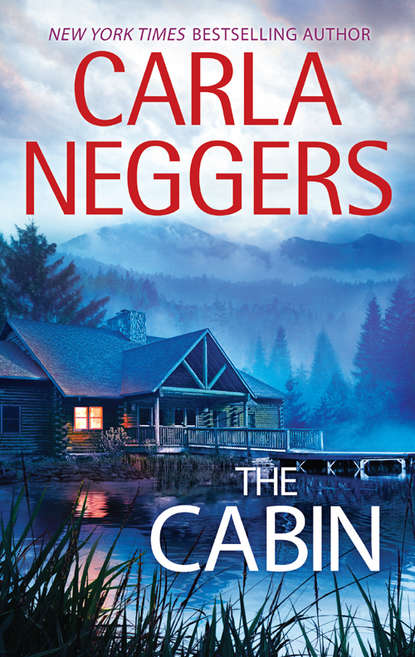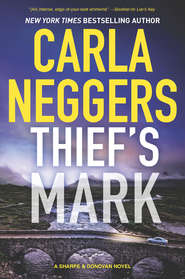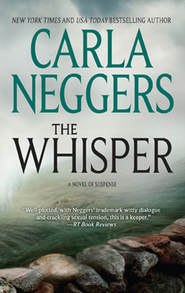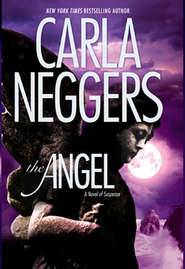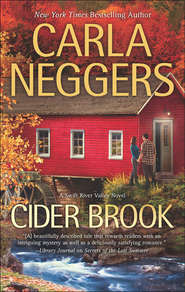По всем вопросам обращайтесь на: info@litportal.ru
(©) 2003-2024.
✖
The Cabin
Автор
Год написания книги
2018
Настройки чтения
Размер шрифта
Высота строк
Поля
“A plumber, a bartender and an artist.” Davey shook his head in amazement. “Who’d have thought it? Although Kevin always was good with the graffiti.”
Susanna smiled. Both her parents were artists, her mother also an expert in antique quilts. They’d surprised everyone seven years ago when they opened a successful gallery in Austin and started restoring a 1930s home, a project seemingly without end. But they still spent summers on the New York shore of Lake Champlain. When Susanna was growing up, they’d moved from place to place to teach, work, open and close galleries and otherwise indulge their wanderlust. They’d been a little shocked when Susanna had gone into financial planning and married a Texas Ranger, but she’d always gotten along well with her parents and had liked having them close by in Austin. They didn’t interfere with her relationship with Jack, but she knew Kevin and Eva Dunning didn’t understand why their daughter was living with Gran. Their response to both Susanna and Jack had been the same: they’d come to their senses soon enough.
Jim examined a frosty bottle of champagne and said idly, as if reading Susanna’s mind, “You’ve never explained what it was that made you come up here. Did you and Jack have a big fight, or did you just wake up one day and decide you needed to hear a Boston accent?”
“Maggie and Ellen had already planned to spend a semester up here—”
“Like it’s Paris or London,” Davey said. “Their semester abroad.”
“Their semester with Gran,” Susanna corrected.
“Yeah, now it’s a year,” Jim said, “and it doesn’t explain you.”
“There was a stalker.” The words were out before she could stop them. “I suppose technically he wasn’t a stalker—he turned up where I was a couple of times, but I can’t prove he followed me. I didn’t even know who he was until he showed up in my kitchen. He said things.”
Davey Ahearn swore under his breath. Jim stared at her, grim-faced, neither man kidding now. “What did you do?” Jim asked.
Susanna blinked rapidly. What was wrong with her? She’d never told anyone this. No one. Not a soul. This was a secret, she thought. “I tried not to provoke him. He wanted me to talk to Jack on his behalf. He said his piece and left.”
Jim looked tense. “Then what?”
“Then...nothing. I decided to come up here with Maggie and Ellen. Stay a few weeks.” She almost smiled. “Clear my head.”
Jim Haviland held his champagne bottle to one side and studied her closely while she ate more of her chili, barely tasting it now. Finally, he shook his head. “Jesus. You didn’t tell Jack about this bastard in your kitchen.”
“I know it sounds irrational.” She set her fork down and sniffled, picking up her margarita glass, noticing the slight tremble in her hand. “I mean, Jack’s a Texas Ranger. You’d tell him if you had a stalker, right?”
“Goddamn right. It’s one thing not to tell Jack about buying a cabin in the mountains, but a stalker—”
“It seemed to make sense at the time.”
Jim inhaled sharply, then breathed out. “Tell him now. You can use the phone in back. Call him right now and tell him.”
“It’s too late. It wouldn’t make any difference.”
“This guy’s in jail?”
She shook her head.
Jim narrowed his gaze on her. “Dead?”
“No, he’s never been charged with anything. He’s a free man.”
“Because you never told anyone he was stalking you—”
“No, no one would be interested in my stalking story. He’d just explain it away. Coincidence, misunderstanding, desperation. The authorities would never touch it, now or then.” She sipped her margarita, the melting ice diluting the alcohol. “They wanted this guy for a much bigger crime than spooking me.”
This got Davey Ahearn’s attention. “Yeah? Like what? What else did he do? Kill his wife?”
“Yes, as a matter of fact, Davey, that’s exactly what he did.” Susanna stared up at the television and watched the clock tick down to midnight. Four minutes to go. Three minutes and fifty-nine seconds. Happy New Year. “He killed his wife.”
Two
Jack Galway woke on New Year’s Day to an empty bed, a raging headache and dark thoughts about his wife. Push was coming to shove between the two of them. He didn’t know when or how, but it would. Soon. He was tired of waking up alone in bed. He was tired of being pissed off about the things she hadn’t told him. Susanna and her secrets.
He’d celebrated last night with his daughters and about a million of their friends. No alcohol. They were under twenty-one, and he had to drive a bunch of them home. He was in bed by one. Alone.
Last year was better. Maggie and Ellen had gone to a friend’s house, and he and his slim, dark-haired, green-eyed wife had headed straight for the bedroom. He supposed they should have worked on some of their “issues” then. But they hadn’t. The emotions between them—the anger and frustration—were still too volatile. They were locked into their silence, stubborn. And it had been too many weeks without making love.
Jack gritted his teeth. There was no point in dwelling on last year, but the truth was, he’d thought a night in bed with him would at least keep his wife from going back up to Boston. Wrong.
Steeling himself against his pounding head, he rolled out of bed and pulled on jeans and an ancient sweatshirt. With Susanna in Boston making her damn gazillions, he tended to keep his jeans and sweats in a heap on the floor. What the hell difference did it make?
He headed down to the kitchen for aspirin. Maggie and Ellen, wide awake and dressed, whirled around him, pots and bowls out, the mixer, eggs, milk, lemons, a five-pound bag of sugar. Then he remembered their New Year’s Day Jane Austen fest. Tea, scones, lemon curd, clotted cream, watercress sandwiches and one Jane Austen movie after another. It was an all-day event. They’d invited friends.
Jack stifled a groan and gulped down two aspirin. He could feel his headache spreading into his eyes.
Ellen pushed past him with the scone bowl and set it in the sink. She was athletic and pretty with chestnut hair that was so like Iris Dunning’s before hers had turned white. Ellen’s eyes were dark like his, and she was better-tempered than either parent, a people person and a rugby player with a perpetual array of bruises on her legs.
She turned on the water into the bowl. “We’ve decided to start with the Laurence Olivier and Greer Garson Pride and Prejudice. That makes sense, don’t you think, Dad?”
Jack nodded. “Sure.”
“You can watch it with us if you want—”
“Ellen.” Maggie swung around from the stove. She was dark-haired and willowy like her mother, hardheaded like both parents, but, somehow, she’d managed to inherit Kevin and Eva Dunning’s artistic streak. She, too, had her father’s dark eyes. “Dad is not invited. Remember? You know what he’s like. He’ll make comments.”
Ellen bit her lower lip. “Oh, yeah. What was I thinking? Dad, you’re not invited.”
“Good,” he said. “I’ll go for a run and make myself scarce.”
He headed back to his bedroom and changed into his sweats, drawing on years of training and self-discipline not to fall back onto his bed and dream about his wife. He could hear East Coast tones slipping into Maggie and Ellen’s speech. At least they’d done Jane Austen fests and high teas before they’d moved north. He hadn’t objected to a semester in Boston, a chance for them to live with their great-grandmother and really get to know her. Iris Dunning was a special lady. But he did object to Susanna heading up there—not that he’d asked her to stay or come back. Not explicitly. But she knew what he wanted.
He hadn’t expected Susanna to last past the first hard frost. She was used to life in south Texas. It was home. She knew she belonged here, but she was just fighting it, hanging in up in Boston, because it was easier than fighting him. Easier than admitting to her fears, dealing with them.
Easier than coming clean with him.
He knew he’d contributed to the impasse between them. He’d tried to deny it for months, but now he couldn’t. He was still contributing by not talking to her, not telling her what he knew. What he feared—not that he was supposed to be afraid of anything. He definitely had his own sorting out to do.
He pushed thoughts of his wife to the back of his mind. Maybe some action was called for on his part, but he didn’t know what. The status quo was aggravating, but doing something stupid and losing Susanna altogether—that was unthinkable.
He slipped out into the bright, warm San Antonio morning, breathing in the slightly humid air and making himself hear the birds singing. He started on his ten-mile route through the pleasant suburban neighborhood where he and Susanna had raised their twin daughters. Everything about his home said “family man.” Husband, father. Their house had a big family room, a nice laundry room, pictures of sunflowers and chickens in the kitchen. He remembered teaching the girls how to ride bikes on this very street. Maggie hadn’t wanted any help whatsoever. Ellen had accepted all help but still managed to bust herself up a few times.
He hated to see them fly back to Boston in a couple of days. He knew he could go with them. He was due some time off.
His headache dissipated after the first agonizing mile of his run. Then he went into a kind of zone, jogging easily, not thinking, just putting one foot in front of the other. That was what he’d done in every area of his life for the past fourteen months. Put one foot in front of the other. Steady if not patient, pushing ahead but always coming back to where he started, never getting anywhere.
“Damn it, Susanna.”





